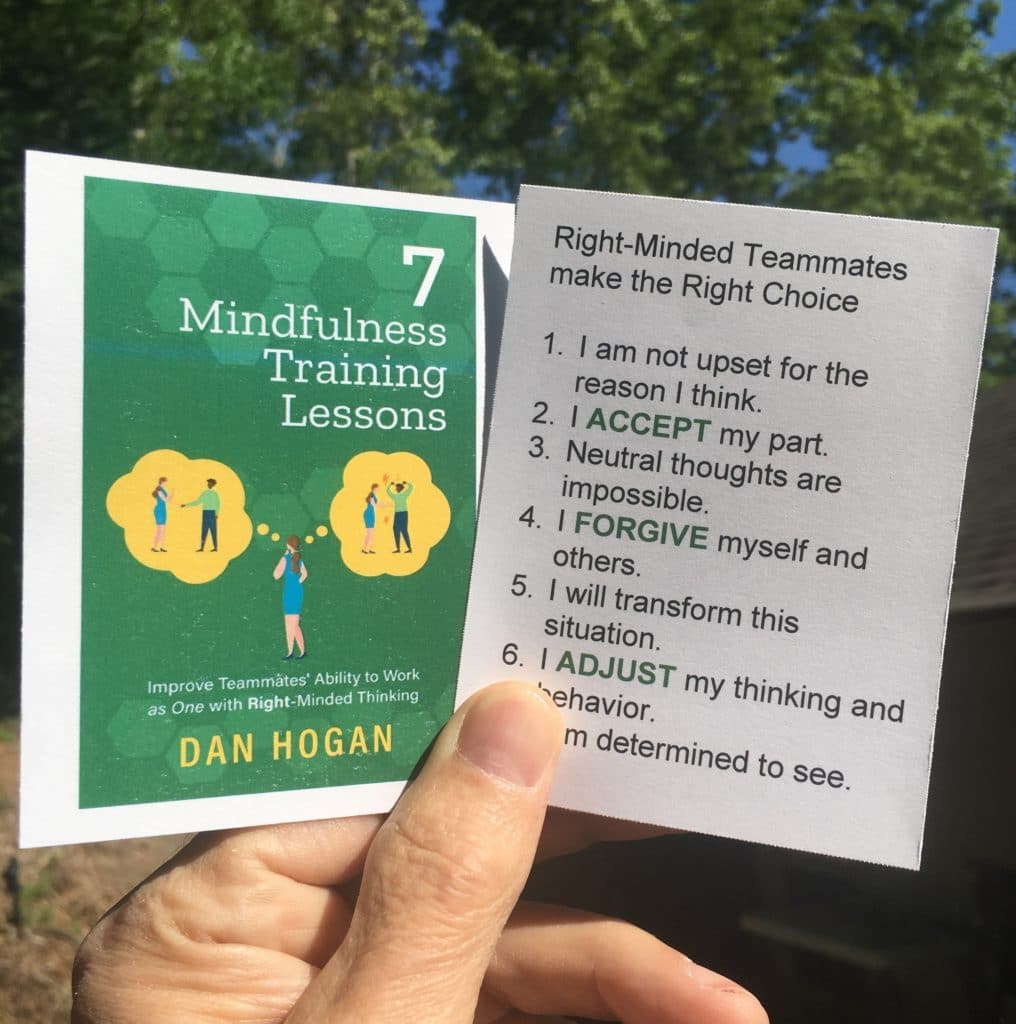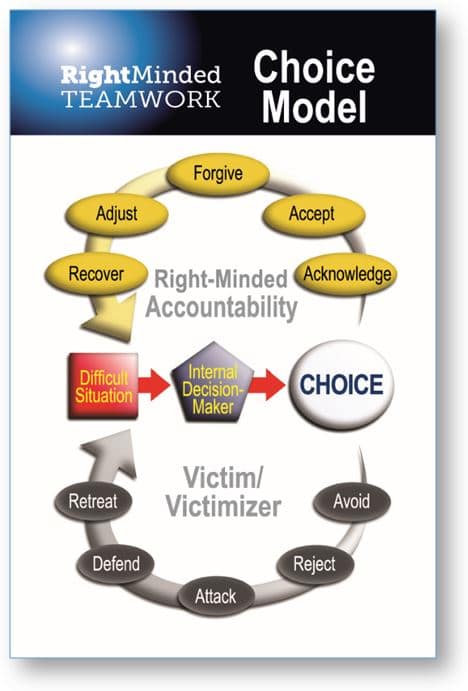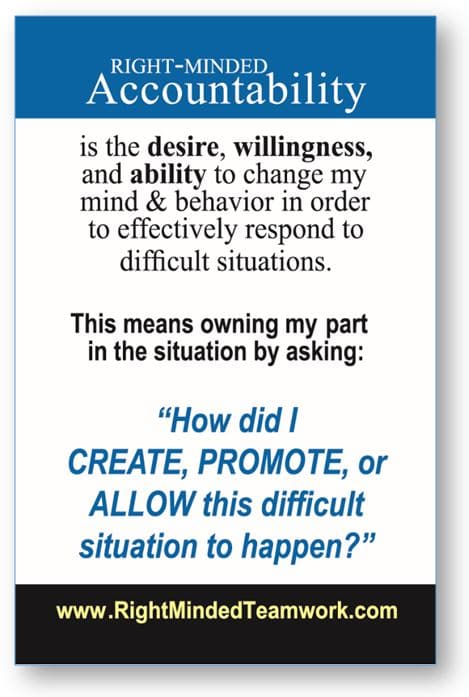7 Mindfulness Training Lessons
In this article, you will learn how to use these 7 Mindfulness Training Lessons to transform what we have identified as the Constantly Complaining Teammate Disorder.

Why do we advocate for transforming this teammate relationship?
- Their disruptive behavior is hurting your team’s performance.
- Plus, the team may benefit if the teammate has legitimate complaints that need correcting.
So, we believe it is far better for teams to address these relationships and transform them into new and productive relationships.
In this article, you will find out how you can do just that – transform the relationship.
But first, we will briefly review the 7 lessons along with a testimonial. After that, we will discuss how to apply the first two lessons to transform the relationship.
If you believe these lessons will benefit you and your team, you can learn the remaining lessons by downloading the 7 Mindfulness Training LessonsAchieving Right-Minded Teamwork involves adopting an attitude of mindfulness. These 7 Lessons teach how to do no harm and work as one. More book.
Use these 7 Lessons to Transform the Constantly Complaining Teammate Relationship
These lessons are from our book, 7 Mindfulness Training Lessons: Improve Teammates’ Ability to Work as One with Right-Minded Thinking.
They are universal and beneficial lessons. You can apply them anytime and anywhere. They will help you transform any difficult situation.
See a testimonial below.
In every circumstance, and especially during difficult team situations, Right-Minded Teammates practice these mindfulness lessons to move them into the right-minded way of thinking and behaving.
Apply these lessons, and you will experience joy, happiness, and success.
And you might be surprised to learn that transforming the teammate is not likely what you think.
Keep reading to find out how and why.
What are the 7 Lessons?
The lessons can be summed up in one sentence, with particular emphasis on just three words:
Right-Minded Teammates accept, forgive, and adjust their thinking and work behavior.
Here are the seven lessons:
- I am not upset about this difficult team situation for the reason I think.
- I accept and own my part in this situation.
- It’s impossible that my thoughts about this situation are neutral.
- I forgive others and myself.
- I will transform the effects of this difficult team situation.
- I adjust my thinking and behavior.
- I see every difficult team situation as a learning opportunity.
These lessons are effective. They are a self-study course in mindfulness. They will help you take control of your mind.
Mindfulness is your conscious ability to monitor your thoughts in the present. At the same time, you calmly acknowledge and accept your thoughts, feelings, and behaviors and those of others.
Within the Right-Minded Choice Model, mindfulness is described as “your desire, willingness, and ability to change your attitude and behavior to effectively respond to difficult team situations.”
When you practice mindfulness, you are putting right-minded attitudes and behaviors into action.
Testimonial
I was reflecting on a challenging situation with a fellow entrepreneur, and as I was trying to figure out how I wanted to approach it, the first of the 7 Lessons of Right-Minded Thinking popped into my mind. “I am not upset about this difficult team situation for the reasonReason is a mythological character and symbolic guide who shows you how to think and behave in a Right-Minded way. As your Right-Minded teacher, Reason helps you differentiate and choose between Right-Minded and wrong-minded attitudes and behaviors. More I think.”
So, I applied it, then figured I might as well apply the next few steps, too.
As I did, I could feel myself relaxing, and, in just a few moments, I was able to see the situation completely differently.
My inner resistance has dissipated, and therefore the issue has, too. Woohoo!
I had no doubt your methodology was effective but didn’t realize how much I was absorbing and how immediately effective it could be.
So, thank you and RMT for this personal breakthrough! 🙂
Applying The 7 Lessons
Let’s take a closer look at the sentence that sums up the seven lessons:
I accept, forgive, and adjust my thinking and work behavior to effectively respond to difficult team situations.
More specifically, let’s look at the three bold words: accept, forgive, and adjust. Those three words describe your mindful willingness to look within and choose how to respond to any and every situation you encounter.
You must look within because that is where you can find right-minded answers that correct mistakes and resolve difficult team situations.
To do so, you must monitor your thinking. Plus, you must pay attention to the conversations you have with others. Observing your thoughts and communications is looking within.
Looking within and deciding to make mindful, right-minded choices, even during chaos, yields mature work behavior instead of reactive conflict. This right-minded behavior increases the likelihood of transforming any difficulty into a safe learning experience.
To teach these lessons, we use a situation you likely know very well: The Constantly Complaining Teammate (CCT).
In the book, you will learn how to use all 7 lessons to transform the way you interact with this teammate. Once you understand how to apply the lessons in this situation, you will be prepared to do the same in other challenging conditions.
Applying Lessons 1 & 2
Here’s how to use these 7 lessons to transform the constantly complaining teammate.
The first two lessons can be summarized in a word: accept. Training your mind means you first accept the difficult situation by going through two periods:
- The period of new awareness.
And then a …
- Period of owning up.
These periods may last only a few minutes, but more often, they last much longer. They don’t need to be painful but usually are. However, the pain comes mostly from you. It’s rooted in your belief that the difficulty is somehow taking away valuable things from you, or that your sense of worth is being challenged.
By applying these two lessons as soon as you can, you start the process of recognizing the lack of value you think you’re losing. You also realize the so-called challenge is mostly an emotional reenactment of memories of when you were wronged or hurt.
Here’s the first lesson and how to apply it.
Lesson #1: the period of new awareness.
1. I am not upset about this difficult team situation for the reason I think.
The word “upset” can mean many different things, such as anger, fear, anxiety, guilt, or shame. When you look at the situation, you can decide the term that most accurately describes what you are experiencing and feeling.
The difficulty evokes memories, which is why you’re not upset for the reason you think. This doesn’t mean the constantly complaining teammate doesn’t need to change. It only means you should not be upset with them for something that happened in your past.
If you become upset, you have given your power away. You believe the circumstance determines how you feel.
That is not true. But at the moment, you don’t believe it because you are upset.
Here’s how to transform that mindless thought.
When you notice you are upset, stop, and quietly say to yourself.
I am not angry at ______ for the reason I think.
I am not afraid of ______ for the reason I think.
I am not worried about ______ for the reason I think.
I am not depressed about ______ for the reason I think.
Your honest look will help you remember you had a sibling or a schoolmate who constantly complained, but instead of being coached and corrected, they were rewarded and promoted. You have always felt this was unfair.
Listen carefully. It’s your belief in the unfairness that is upsetting you.
To move back to your right mind, you want to accept and own that you are emotionally reliving your memories. Again, it doesn’t mean that the CCT behavior you are observing is acceptable. It merely means you are choosing not to let their behavior rule your mind.
This period of renewed awareness is necessary and usually brings up past pain. Continue to apply the next lesson because it will help you move back into your right mind where the pain will subside.
Here’s the second lesson and how to apply it.
Lesson #2: the period of owning up.
2. I accept and own my part in this situation.
In this lesson, the Right-Minded Teammate always goes within and asks themselves, “What did I do to create, promote or allow the constantly complaining teammate to _______?”
Even though a constantly complaining teammate is tough to work with every day, other teammates’ behavior, including yours, is likely, in some way, enabling that teammate to continue complaining.
For example, the Right-Minded Teammate could answer the “…create, promote, and allow …” question this way:
When I talk with him while he’s complaining, I communicate in a derisive and argumentative way, which only makes him complain even more. This is how I am helping to create this difficulty.
When I see him coming my way, I turn away to ensure we don’t bump into one another. He likely sees me do that, and it might frustrate him. My avoidance behavior is, essentially, allowing him to continue complaining.
I often complain about him to others behind his back. Maybe he’s heard I’ve done this, which just makes him complain even more. This “behind his back” complaining is helping promote this difficulty.
These two lessons are about acceptance. They are necessary steps in transforming this difficult situation.
By applying these lessons, you accept you have only been temporarily out of your right mind, which makes it easier to forgive yourself for doing whatever you have done.
Here are the remaining abbreviated lessons.
Lesson #3: It’s impossible for me to have neutral thoughts.
“This thought about ____________ is not a neutral thought.”
Lesson #4: I forgive others and myself.
“I forgive myself, at least this time, for resisting and not listening to his complaints.”
Lesson #5: I will transform the effects of this difficult team situation.
“I will transform the effects of ___________ by remembering the choice is mine.”
Lesson #6: I adjust my thinking and behavior.
“When I know I have to talk with him, I’ll remind myself I am in charge of what I think and do and say.”
Lesson #7: I see every difficult team situation as a Right-Minded Teamwork learning opportunity.
“I am determined to convert my mistakes and learn from them. I’m not a victim of the world I see.”
Conclusion: Did you really use these 7 lessons to transform the constantly complaining teammate?
Not exactly. But you might have.
First, you changed your mind. Second, you might have changed the complaining employee.
Most importantly, you succeeded in transforming your mind. In turn, you choose to see the complaining teammate differently. Therefore, you took your power back by not letting their complaints upset you.
Moreover, the complaining teammate experienced your right-minded attitude and behavior.
Likewise, they might have realized that your behavior was more desirable than their complaining. Since they want to be more like you, they could have transformed their attitudes and behaviors.
So, now we can say, you can never transform another person.
You can only change your mind about the way you see and work with them.
By the way, you can use this same internal process to transform a bullying relationship. I wrote about that here: Workplace bullies are NOT the only people who must change; decent people must change too!
Your Next Steps
You and your teammates will greatly benefit when you apply 7 lessons in your life.
You will be happier and more productive.
Applying these lessons will transform your team into a joyous classroom. And your team’s customers will love working with you even more than they do today.
To finish the remaining 5 lessons, download 7 Mindfulness Training Lessons: Improve Teammates’ Ability to Work as One with Right-Minded Thinking.

To Your Success, Dan



